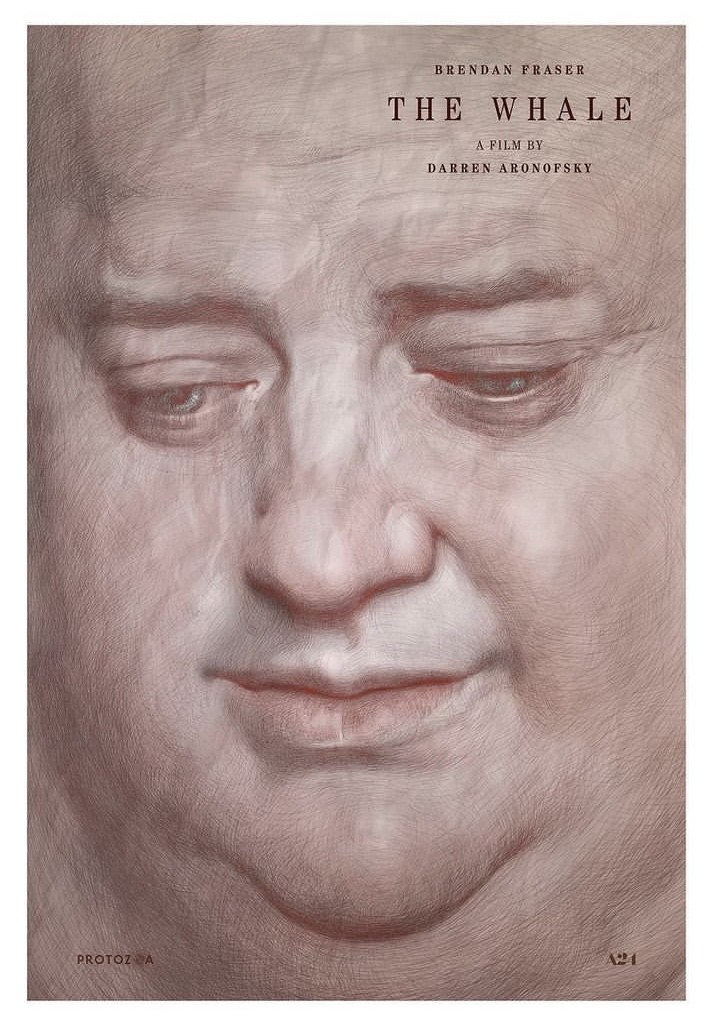The Whale, Darren Aronofsky’s cinematic adaptation of Samuel D. Hunter’s play, captivated audiences with Brendan Fraser’s Oscar-winning performance as Charlie. Beyond the accolades, the film delves deep into the human psyche, making it a profoundly psychological exploration of grief, trauma, and self-destruction. This analysis will explore why “The Whale” resonates so deeply with viewers on a psychological level.
Charlie’s Confined World: A Breeding Ground for Psychological Turmoil
The film’s setting, Charlie’s cramped apartment, immediately establishes a sense of confinement. This physical restriction mirrors Charlie’s internal struggles, highlighting his isolation and the limitations imposed by his obesity. The limited cast of five characters further intensifies the claustrophobic atmosphere, focusing the narrative on the complex interplay of their relationships and the psychological impact they have on Charlie.
The Whale movie poster visually represents Charlie’s confined world.
Trauma, Grief, and the Cycle of Self-Destruction
Charlie’s past is riddled with tragedy, including the loss of his partner, Alan, to suicide and the subsequent estrangement from his daughter, Ellie. These traumatic events fuel a vicious cycle of binge eating as a form of emotional regulation and a desperate attempt to cope with overwhelming grief and self-loathing. The film subtly reveals the profound impact of Alan’s rejection by his family and church due to his relationship with Charlie, adding another layer of complexity to Charlie’s psychological burden.
A Compassion Focused Lens: Understanding Charlie’s Deep-Seated Fears
Utilizing principles from Compassion Focused Therapy, we can analyze Charlie’s behavior through the lens of his deep-seated fears and the protective strategies he employs. His obesity and isolation serve as defenses against a world that has repeatedly inflicted pain and rejection. These coping mechanisms, while offering temporary solace, ultimately perpetuate a cycle of self-destruction, further deteriorating his physical and mental health.
A psychological formulation diagram visually illustrates the interplay of Charlie’s fears, protective strategies, and their consequences.
Hope Amidst Despair: The Redemptive Power of Connection
Despite the darkness that envelops Charlie, the film portrays glimmers of hope. His inherent kindness, his passion for teaching, and his unwavering love for Ellie shine through. His desperate plea to know he’s done one thing right in his life underscores his yearning for redemption and connection. His attempts to reconnect with Ellie, to help her see her own worth, become a driving force in his final days. Ultimately, his self-sacrifice for Ellie’s future suggests a final act of love and a potential breaking of the destructive cycle.
The Psychological Impact on Viewers
“The Whale” is a psychologically impactful film because it confronts viewers with uncomfortable truths about human nature: the devastating consequences of trauma, the complexities of grief, and the struggle for self-acceptance. Charlie’s journey resonates deeply because it taps into universal experiences of loss, regret, and the enduring power of hope. The film’s unflinching portrayal of these psychological themes invites viewers to engage in introspection and empathy, leaving a lasting impression long after the credits roll.

